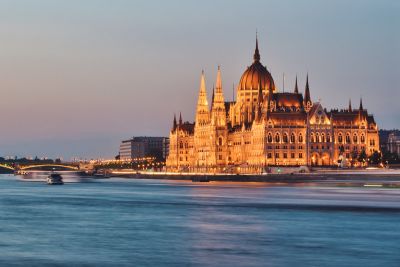European Diary: Budapest, November 2021
 Budapest is one of the many European cities that breathe history. It was originally two cities, Buda and Pest, on the opposite banks of the Danube River, populated by the Hungarians who in the ninth century suddenly appeared in Europe from the Asian steppes. Pillaged by Mongolian invaders in mid-thirteenth century, Buda, the capital of the Kingdom of Hungary, nevertheless became a centre of Renaissance culture, which abruptly ended when the Ottomans occupied it in 1526. The two cities were only liberated by the Habsburgs in 1686. They were unified into one city, Budapest, in 1873 and formed the co-capital of the Austro-Hungarian Dual Empire until 1918. This was the golden age of Budapest, with many magnificent neo-classical buildings being constructed and the city becoming a vibrant, cosmopolitan centre. After the First World War, however, Hungary lost two thirds of her territory while more than three million Hungarians suddenly found themselves subjects of other countries, mainly Czechoslovakia and Romania, but also Yugoslavia. (So much for national self-determination!) The monarchy was not formally abolished, and Miklós Horthy, an Admiral in the former Austro-Hungarian Navy, suppressed a communist insurrection and became regent. The wits observed that Hungary was a monarchy without a king, governed by an admiral without a navy, in a country without a coast.
Budapest is one of the many European cities that breathe history. It was originally two cities, Buda and Pest, on the opposite banks of the Danube River, populated by the Hungarians who in the ninth century suddenly appeared in Europe from the Asian steppes. Pillaged by Mongolian invaders in mid-thirteenth century, Buda, the capital of the Kingdom of Hungary, nevertheless became a centre of Renaissance culture, which abruptly ended when the Ottomans occupied it in 1526. The two cities were only liberated by the Habsburgs in 1686. They were unified into one city, Budapest, in 1873 and formed the co-capital of the Austro-Hungarian Dual Empire until 1918. This was the golden age of Budapest, with many magnificent neo-classical buildings being constructed and the city becoming a vibrant, cosmopolitan centre. After the First World War, however, Hungary lost two thirds of her territory while more than three million Hungarians suddenly found themselves subjects of other countries, mainly Czechoslovakia and Romania, but also Yugoslavia. (So much for national self-determination!) The monarchy was not formally abolished, and Miklós Horthy, an Admiral in the former Austro-Hungarian Navy, suppressed a communist insurrection and became regent. The wits observed that Hungary was a monarchy without a king, governed by an admiral without a navy, in a country without a coast.
Three Hungarian Economists
Moreover, Hungary almost became a country without thinkers, because in those hard times many original and significant writers and scholars moved abroad, including the brilliant novelist and polemicist Arthur Koestler, later to become the most effective anti-communist intellectual of the Cold War, Michael Polanyi, a renowned chemist, but also a respected philosopher of science and society, and Peter Bauer, a specialist on economic development, elevated by Margaret Thatcher to the House of Lords. I knew Lord Bauer personally: we often met at meetings of the Mont Pelerin Society, an international academy of scholars founded by Friedrich von Hayek in 1947. Bauer was a persuasive critic of the aid without development which could be witnessed in poor countries, wanting to replace it with development without aid, through free trade, foreign investments and the rule of law. Incidentally, two other Hungarian economists with very different political views had in the 1960s been influential advisers to British Labour governments, Nicholas Kaldor and Thomas Balogh, both eventually elevated to the House of Lords. They were known as the ‘Budapest lords’, as Kaldor was fat and jovial and therefore obviously the Buddha, whereas Balogh was thin and unpleasant, the pest. I once met Kaldor. He denounced monetarism in a lecture at the University of Iceland on 18 June 1981 where I asked some critical questions which he politely answered. It is a different story that Kaldor’s suggestion of an expenditure tax has some merits.
Wine Tasting in Budapest
After the collapse of communism, Budapest has regained a lot of its old charm, and I visited the city in November 2021 as the guest of the Danube Institute, ably run by John O’Sullivan who was an adviser to and speechwriter for Margaret Thatcher, and later an editor at Radio Free Europe and then National Review. John, a practising catholic and a thoughtful conservative with classical liberal leanings, wrote a remarkable book, The President, the Pope, and the Prime Minister, where he argued that the Soviet Union was really brought down by the singular coincidence that three forceful and charismatic anti-communists occupied at the same time the offices of the President of the United States, the Head of the Catholic Church, and the Prime Minister of the United Kingdom, Ronald Reagan, John Paul II (Karol Wojtyla), and Margaret Thatcher. A friend of mine, Richard Bolton, a wine collector and connoisseur, was in Budapest at the same time as I. He had brought with him a few nice bottles from his large collection and we had a memorable wine-tasting afternoon at John’s place with a few sponsors of his institute.
I spent a few days in Budapest, and I would recommend the excellent coffeehouses in the centre. One of them, Scruton, is named after the English philosopher and polymath Sir Roger Scruton who has many admirers in Hungary, including Prime Minister Viktor Orbán. (Incidentally, Orbán attended the same Oxford college as I, Pembroke, but a few years later.) Budapest is however probably best known for the many thermal baths which make use of the city’s hot springs. The biggest and most popular one is Széchenyi, located inside Budapest’s City Park. It is well worth a visit. Again, one night in Budapest I went to the excellent Michelin-one star restaurant Laurel. The decor was modern and the food light and tasty while the waiters were friendly and cheerful.
When Did Conservative Liberalism Emerge?
I spoke at a meeting of the Danube Institute on 8 November about my two-volume book, Twenty-Four Conservative-Liberal Thinkers. In my talk, I identified John Locke, David Hume, and Adam Smith as the founding fathers of the conservative-liberal tradition with their defence of commercial society, spontaneously developed and based on free trade and private property. However, conservative liberalism as a separate tradition was only clearly articulated with the critical response to the French Revolution by Edmund Burke, Benjamin Constant, and Alexis de Tocqueville. The British Revolution of 1688 and the American Revolution of 1776 were made to preserve and expand existing liberties, whereas the French Revolution of 1789 and, much later, the Russian Revolution of 1917, were attempts to reconstruct society according to the ideas of Rousseau and Marx, respectively. Such attempts were bound to fail, as Ludwig von Mises and Hayek demonstrated.
I offered my opinion that Hayek was the most distinguished modern representative of this conservative-liberal tradition. His theory of spontaneous order described how coordination without commands was possible and indeed indispensable, utilising both the price mechanism and time-tested practices. Another intriguing conservative-liberal thinker was Michael Oakeshott who argued that modern man had acquired the will and the ability to make choices and that accordingly the society fit for modern man was that in which government only enforced general (end-independent) rules enabling different individuals to live peacefully together.
Is Something Amiss in Classical Liberalism?
Two scholars associated with the Danube Institute, Professor Ferenc Hörcher and Dr. David L. Dusenbury, commented on my presentation. They both criticised it from a conservative point of view, although they agreed that conservatives and liberals should stand united against socialism. It seemed to them that I was really presenting classical liberalism rather than any kind of conservatism. What was lacking in classical liberalism was however a sense of community, an awareness of the many ties and commitments people had by virtue of their identity rather than their choices. In response, I pointed out that especially Burke and Tocqueville were very much aware and in favour of such ties and commitments: they envisaged a vibrant civil society, not only an almighty state confronting separate and therefore powerless individuals. It was true, I conceded, that commercial society could dissolve or at least challenge some traditional communities, but at the same time it facilitated the creation of new communities. The best example was the family: there comes a day when you leave your old family and form a new one. Even in what appears to be a concrete, heartless jungle, such as New York City, there are many active communities, spontaneously formed, although not always visible at first sight.
(The Conservative 26 November 2023.)


Rita ummæli